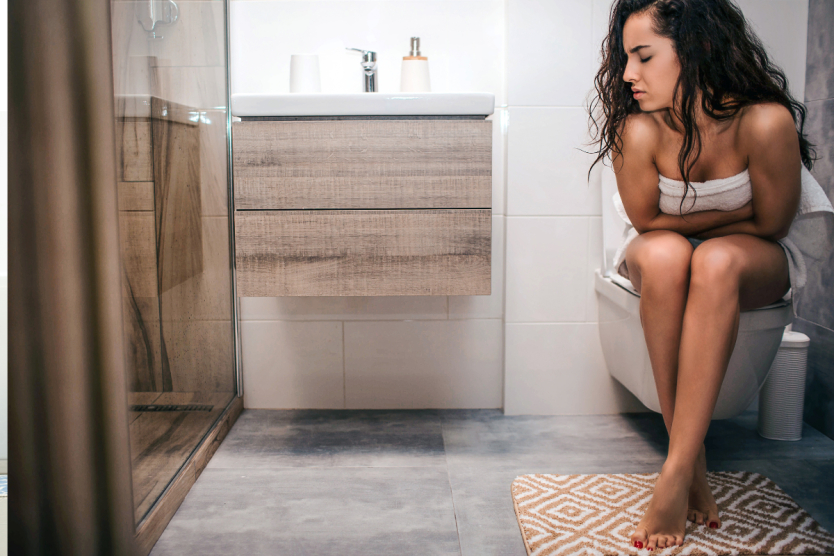Talking about poo is sometimes taboo.
Despite hesitation to discuss bowel movements, what’s happening in the bathroom is an important health issue. Your bowel and its control is a complex process that involves the coordination of many different muscles and nerves.1 When something goes wrong, it can be a sign of a bigger issue. That’s how constipation, diarrhea and your pelvic floor are connected.
While everyone has different “schedules” and not everyone has a bowel movement daily, you likely know when something is wrong, particularly when you have constipation or diarrhea. Here’s why you need to care about bowel movements and your pelvic floor.
Why Bowel Movements Matter
The bowel is part of the digestive or gastrointestinal system, helping the body absorb nutrients and fluids from the foods we eat and drink, and then disposing of the rest as waste, or stool.1
So-called “normal” bowel movements happen at different frequencies for everyone. What experts call “healthy” bowel movements are those that allow you to empty your colon or intestines often enough that you don’t feel bloated, in pain, or have to strain to poop.2
In summary, here’s what to look for before you flush the toilet:
- if your poop looks like pebbles, you’re constipated2
- if your poop is almost completely liquid, you have diarrhea2
- the best and easiest consistency of stool is soft, like toothpaste3
Constipation, Diarrhea And Your Pelvic Floor
Occasional bouts of constipation or diarrhea can happen to anyone—medications might cause constipation or a spicy meal can lead to short-term diarrhea.
But constipation and diarrhea can also signal something going on with your pelvic floor.
What is the pelvic floor? It’s the hammock-like structure of muscles and tissues that hold your pelvic organs in place. For women, that includes your bladder, uterus, vagina, and rectum.4
These muscles also play a role in your ability to retain and expel stool. If you don’t have full control over your pelvic floor muscles, or if they spasm frequently, you may develop constipation. On the flipside, weakened pelvic muscles can be a cause of bowel incontinence, also known as fecal incontinence.3
Problems like this are known as pelvic floor dysfunction.
Bowel troubles are among the most common side effects of pelvic floor dysfunction:5
- fecal incontinence
- marked change in bowel habits, including constipation or diarrhea
- significant bloating
- abdominal pain and cramping
It’s thought that up to half of the people who experience long-term constipation also have pelvic floor dysfunction.4
Some women suffer from pelvic organ prolapse, which is when the muscles become weak enough that a pelvic organ drops from its usual place in the pelvis. Rectal prolapse—when a portion of your rectum exits out through your anus—can lead to a sense of incomplete evacuation of stool.5
What To Do About Constipation, Diarrhea And Your Pelvic Floor
A treatment plan can be developed based on the cause of your bowel issues. For instance, some women will need training—often from a pelvic floor physiotherapist or pelvic floor occupational therapist—to develop an ability to relax the pelvic floor and fully evacuate the bowel.66
A plan can include learning about healthy bowel habits, including positioning, time spent on the toilet, and facilitating good bowel patterns such as through diet, fiber and fluid consumption.6
Women with weakened pelvic floor muscles or a prolapse will learn exercises to strengthen those muscles. Research has proven that pelvic floor exercises—known as Kegels—can be used as effective prevention and treatment for women suffering with incontinence, pelvic organ prolapse, or even to help prevent these types of pelvic floor issues.
There are even products available to ensure you perform Kegels correctly. Gynesis FDA-cleared pelvic floor trainer shorts support women to take control of their pelvic health with a simple, effective, external, and accessible solution. Using advanced Multipath Technology, Gynesis delivers targeted muscle stimulation with Kegel exercises that helps retrain and rebuild your pelvic floor—so you can achieve stronger bladder control and with confidence.
There is hope! Don’t suffer in silence with bowel issues like constipation, diarrhea, or other pelvic floor problems.
See Your Doctor
If you’re suffering from constipation, diarrhea, or pelvic floor problems, use our Physician Finder to find a doctor near you with expertise in women’s health. Your treatment plan may include working on your pelvic floor muscles with a goal to improve your bowel health.
















